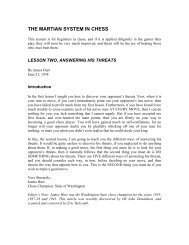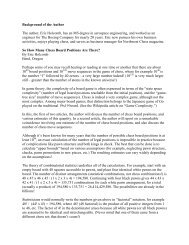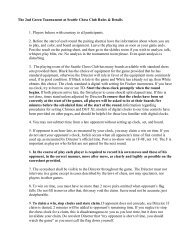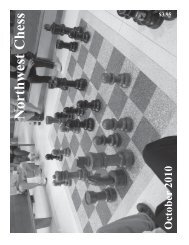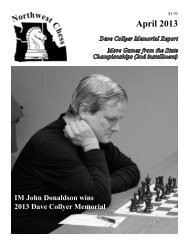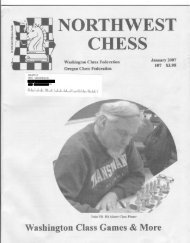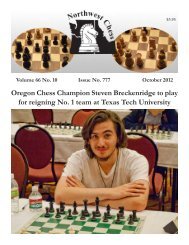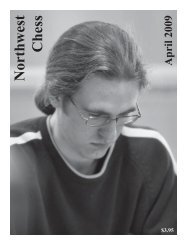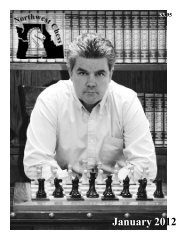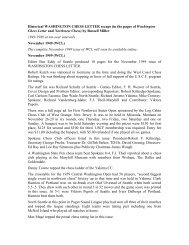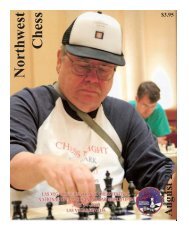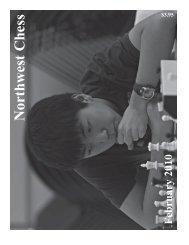201108 - Northwest Chess!
201108 - Northwest Chess!
201108 - Northwest Chess!
- No tags were found...
You also want an ePaper? Increase the reach of your titles
YUMPU automatically turns print PDFs into web optimized ePapers that Google loves.
August 2011$3.95<strong>Northwest</strong> <strong>Chess</strong>
<strong>Northwest</strong> <strong>Chess</strong>August 2011, Volume 65,08 Issue 763ISSN Publication 0146-6941Published monthly by the <strong>Northwest</strong> <strong>Chess</strong> Board.Office of record: 3310 25th Ave S, Seattle, WA 98144POSTMASTER: Send address changes to:<strong>Northwest</strong> <strong>Chess</strong>, PO Box 84746,Seattle WA 98124-6046.Periodicals Postage Paid at Seattle, WAUSPS periodicals postage permit number (0422-390)NWC StaffEditor: Ralph Dubisch,editor@nwchess.comPublisher: Duane Polich,publisher@nwchess.comBusiness Manager: Eric Holcomb,eric@holcomb.comBoard RepresentativesDavid Yoshinaga, Dale Wentz,Josh Sinanan & Dan MathewsEntire contents copyright 2011 by <strong>Northwest</strong> <strong>Chess</strong>.All rights reserved. Published opinions are those of thecontributors and do not necessarily reflect the views ofthe editor or the <strong>Northwest</strong> <strong>Chess</strong> Board.Advertising RatesDisplay ads run $150 for a full page, $100 fortournament ads; $85 for a half-page, $60 fortournament ads; $50 for a quarter page, $30 for aneighth of a page, and $20 for a business card-sizead. Additional charges apply if the staff must dolayout work. A 15% discount is available for twoor more consecutive ads of the same size.Event Announcement RatesEach appearance in the Future Eventslistings costs $20. Please arrange payment forads and Grand Prix fees with the BusinessManager.Advertising & Copy DeadlineAds and submissions must be received by the10th of the month for the items to appear in thenext issue (e.g., August 10 for the Septemberissue; September 10 for the October issue).Submit all ads, donations, payments,changes of address, & subscriptions to:Business Manager, <strong>Northwest</strong> <strong>Chess</strong>Eric Holcomb1900 NE Third St, Ste 106-361Bend OR 97701-3889Eric@Holcomb.comwww.nwchess.comSubmissionsSubmissions of games, stories, photos, art, andother original chess-related content areencouraged! Multiple submissions areacceptable; please indicate if material isnon-exclusive. All submissions are subjectto editing or revision. Send via U.S. mail to:<strong>Northwest</strong> <strong>Chess</strong>Ralph Dubisch, EditorPO Box 9345, San Jose, CA 95157or via e-mail to:editor@nwchess.comContentsCover art: Susan Polgar Invitational for GirlsHeather Young of Vancouver (center) represents Washington in the 2011Susan Polgar National Invitational for Girls. Also pictured (l to r): TD FrankNiro, GM Susan Polgar, and Heather’s parents, Ron and Peggy Young.Photo credit: Courtesy of the Susan Polgar FoundationPage 3:Page 3:Page 4:Page 10:Page 13:Page 14:Page 18:Page 21:Page 23:Page 24:In Praise of GM Seirawan ....... David Kelley and August PiperEditor’s Desk ..................................................... Ralph Dubisch2011 Washington Open ......................................... Georgi OrlovCollyer Memorial Game ......... Cameron Leslie and Ted CattonBook Reviews .................................................. John DonaldsonEmerald City Open .................................................. Fred KleistTheoretically Speaking ........................................ Bill McGearyNWGP 2011 .........................................................Murlin VarnerSeattle <strong>Chess</strong> Club EventsFuture EventsBusiness ManagerEric Holcomb1900 NE Third St, Ste 106-361Bend OR 97701-3889Eric@Holcomb.com<strong>Northwest</strong> <strong>Chess</strong>www.nwchess.com<strong>Northwest</strong> <strong>Chess</strong> KnightsPlease donate today to help <strong>Northwest</strong> <strong>Chess</strong>!Patrons, 2010-2011Kate Tokareva, Michael Wang, Alan Walker, Gerard Van Deene, Dale Wentz,Russell Miller, Ralph Dubisch, Frank Niro, Michael and Jeff Omori,August Piper, Robert Brewster, Steve Buck, Jeff Pennig,Murlin Varner, Inner Sound, Gene Milener, Dennis Jenquin.Washington <strong>Chess</strong> Federation, Oregon <strong>Chess</strong> Federation<strong>Northwest</strong>Grand PrixAdministratorMurlin Varner13329 208 Ave NEWoodinville, WA 98072EditorRalph DubischPO Box 9345San Jose, CA 95157editor@nwchess.comMEVjr54@yahoo.com 425-882-0102Page 2 <strong>Northwest</strong> <strong>Chess</strong> August 2011
Grandmaster Seirawan at the Seattle <strong>Chess</strong> Clubby David Kelly and August PiperYasser Seirawan.<strong>Chess</strong>players all over the world know about the handsome,bushy-headed youngster who, years ago, evolved from GarfieldHigh School student and upstart coffeehouse player to strongcandidate for the World Championship.The talent that propelled Grandmaster Seirawan – Yaz to hisfriends – to those heights was obvious this past April 10 when hevisited the Seattle <strong>Chess</strong> Club. He was donating his time to thefund-raising event the club held that day.During his talk, Yaz held the packed room spellbound. Hisprodigious chessplaying skills were much in evidence as he analyzed– from memory! – several of his most exciting games. He revealedthe rich subtleties of his over-the-board analysis, as well as his deeppenetration into middlegame complexities. Such a demonstrationof his ability was, of course, only to be expected: he is, after all,one of the world’s best players.Grandmaster Seirawan showed several other impressive qualitiesduring that Sunday afternoon, and, rather than his chessplayingskills, it is those qualities we want to highlight here.His sheer indefatigability was notable. After standing for fourhours with only one break, he looked just as fresh, just as full ofenergy and enthusiasm, during the last hour as during the first. Heclearly wanted his audience to have an enjoyable time.His generosity also deserves mention. Yaz donated several itemsto the club, including, most notably, a chess set he himself had usedin a championship match. He conducted an auction of these withwit and good humor that sparkled and fizzed like champagne. Wefound ourselves thinking with admiration that he could easily havebeen a stand-up comedian!Or a writer. Yaz has already written several well-received books;at the club fund-raiser, audience members waited in long lines tobuy them. Naturally, our Grandmaster autographed each one. (Hotnews! He is working on a novel!)But perhaps the most impressive quality Yaz displayed was hisgrace in responding to the audience’s questions and comments.Think of it: here is a Grandmaster, a world championship contender,standing before an audience of ordinary chessplayers. TheGrandmaster is inviting them to offer their thoughts about hisanalysis. Most members of the audience are, of course, too shy orembarrassed to say anything; perhaps, they think, the Grandmasterwill ridicule any comment they make. They need not worry: eachquestion or comment elicits from Yaz a gentlemanly and sincere“excellent question!” or “that really goes to the heart of the position,”etc. These gracious responses further cement the audience’s comfortwith, and admiration for, Grandmaster Seirawan.After his stay in Seattle, Yaz went on to compete in the USChampionship in St. Louis. Yaz just missed qualifying for the finalrounds – despite not having participated in top tournament play foreight years. His fans at the Seattle <strong>Chess</strong> Club would like to thinkthat the good energy from his Seattle visit contributed to thisremarkable result.Grandmaster Seirawan’s Seattle <strong>Chess</strong> Club visit was a delightthat succeeded on many levels. Not the least of these was the terrificboost to the club’s fund-raising efforts. Yaz, we thank you!* * * * *Editor’s DeskRalph DubischSad news: Darby Monahan of Everett, Washington, passed awayon July 16 at age 68 from complications of cancer. He was a 22-year veteran of the Army, Navy, and Coast Guard, and then workedfor the US Postal Service.Darby is our current NW Grand Prix leader in class C, and standsthird overall in both points and activity.He is survived by two sons, one daughter, and ninegrandchildren. He will be sorely missed.Tournament Display Advertising:Western States Open, page 9;Oregon Open, page 20;PCC Centennial Open, page 22;Seattle Fall Open, page 23.<strong>Chess</strong> DVDsNow Available throughElliott’s <strong>Chess</strong> School!LEARN CHESS INDEPTH WITH NATIONAL MASTER ELLIOTT NEFF<strong>Chess</strong>4Life also offers:<strong>Chess</strong> CampsPrivate LessonsTournaments<strong>Chess</strong> ClassesAfterschool Program<strong>Chess</strong>4Life CenterFor more info, call 425-283-0549 | www.chess4life.comAugust 2011 <strong>Northwest</strong> <strong>Chess</strong> Page 3
I have not played in the WashingtonOpen for a few years, but after having a goodtournament in Canada the week before, Idecided to play. I signed-up for a timesavingtwo-day schedule. I tried the two-dayschedule before, and the low number ofplayers usually makes for tough games fromthe get-go. The upside is that you caneliminate your top competitors at the start;the downside is the short time control andfour tough games in one day.* * *In the first round I faced Nick Raptiswith White. He played the King’s Indian andin the Classical Variation I sacrificed a pawnfor what seemed like a good initiative. Onmove twenty I originally planned 20. 0-0-0c6 21. Nxb6!? Rxd2 22. Rxd2, with idea tomeet 22. ...axb6 with 23. Rd8+ Ng8 24.Rxc8, but when it came to it, I changed mymind since the lines were too complex and Iwas afraid of missing something (which iscommon when you don’t play for a whileand uncertain of your current capabilities).What followed gave Nick the initiative thatwas likely decisive. However, the timescramble entered the picture and I was ableto draw the game when the dust settled.Georgi Orlov – Nick RaptisWashington Open, Round 1Renton, Washington, May 29, 20111. Nf3 Nf6 2. c4 g6 3. Nc3 Bg7 4. e4 d65. d4 0-0 6. Be2 e5 7. Be3 Ng4 8. Bg5 f6 9.Bh4 g5 10. Bg3 Nh6 11. dxe5 fxe5 12. c5g4 13. Bc4+ Kh82011 Washington Openby Georgi OrlovNxc4 Na6 21. h3With compensation for a pawn.14. ...Bf6 15. Bxf6+ Qxf6 16. Nd5 Qg717. Nd2 dxc5 18. Nb3 b6 19. Qd2 Rd820. Qe320. 0-0-0!? c6 (20. ...Nc6 21. Qe3) 21.Nxb6 Rxd2 22. Rxd2 axb6 23. Rd8+ Ng824. Rxc8Bxf7 Kg7 27. Bb3 Rd4 28. 0-0-0 b5 29. h3c430. Bc2 Na6 31. hxg4 Bxg4 32. f3 Be633. Rh5 Nb4 34. Rxe5 Bf7 35. Rg5+ Kf636. Rf5+ Kg7 37. Rg5+ Kf838. a3 Na2+ 39. Kb1 Rad8 40. Kxa2Rxd2 41. Rxd2 Rxd2 42. Kb1 Rf2 43. Kc1a5 44. a4 b4 45. Rxa5 b3 46. Bd1 c3 47.bxc3 b2+ 48. Kb1 Rf1 49. Kxb2 Rxd11/2–1/2* * *In the second round I played Blackagainst Ignacio Perez. In the WinawerFrench I played 5. ...Qd7, a move that wasfrom time to time in the past employed byYasser Seirawan.This is not a very popular line and it leadsto less-traveled positions. I ended up with a24. ...Ra4! 25. Rxg8+ Qxg8 26. Bxg8 passive game, and Ignacio held the initiativeKxg8 27. Rd1 Kf7 28. Rd8 Na6=. for the first twenty or so moves. I felt his14. Bh423. f5 was perhaps too soon; instead he20. ...Ba6 21. Nd2 c6 22. Nc7 Qxc7 23.14. Nd2 dxc5 15. Nb3 b6 16. Qxd8 Rxd8could play 23. Ng3 and my options wouldQxh6 Qg7 24. Qe6 Bc8 25. Qf7 Qxf7 26.17. Bh4 Rf8 18. Nd5 Ba6 19. Nd2 Bxc4 20.have been too few and far between. Once IPage 4 <strong>Northwest</strong> <strong>Chess</strong> August 2011
played 29. ...Nh7! I knew I had a good game.Eventually Black won a pawn and had awinning ending, but once again it camedown to the clock. Perhaps Ignacio missedhis chance somewhere in the chaos thatfollowed, but I was able to prevail.Ignacio Perez – Georgi OrlovWashington Open, Round 2Renton, Washington, May 29, 20111. e4 e6 2. d4 d5 3. Nc3 Bb4 4. e5 Qd75. a35. ...Bf85. ...Bxc3+ 6. bxc3 b6 7. Qg4 f5 8. Qg3Ba6 9. Bxa6 Nxa6 10. Ne2 Kf7 11. a4 c512. Qd3 Qc8 13. Ba3 Ne7 14. 0-0 +/=.6. Nf3 b6 7. b4 Ne7 8. Bd3 Nbc6 9. Ne2Bb7 10. 0-0 Ng6 11. h4 Be7 12. g3 a5 13.b5 Na7 14. a4 0-0-0 15. Ba3 Bxa3 16. Rxa3Kb8 17. Qc1 h6 18. h5 Nf8 19. Nh4 Nc820. f4 f5 21. g4 Qe7 22. Ng2 fxg429. ...Nh7 30. R3f2 Ng5 31. Qe3 Rhf832. e6 Qd6 33. Kg2 Rf6 34. Qe5 Qxe5 35.dxe5 Rff8 36. Ng636. ...Rxf2+ 37. Rxf2 Nxg6 38. hxg6Nxe6 39. Rf7 Rd7 40. Nf5 Kd8 41. Kg3Ke8 42. Ne3In round three I played Slava Mikhailukwith White. Slava played the GruenfeldDefense and I played a sharp 5. Bf4 variationwith the pawn sacrifice 6. Rc1 dxc4 7. e4.Black came out of the opening with a goodgame and Slava deployed an unusualmaneuver 17. ...Nd3!? 18. Bxd3 cxd3 19.Qxd3 Bxc3!?, to take advantage of mysomewhat leaky pawn structure. After thegame he told me he underestimated 20.bxc3!? which allowed White to create adangerous passed pawn.The position looked fairly balanced sinceWhite’s c-pawn was offset by Black’s strongKnight on d5 and the weakness of f4. Whentime scramble approached, Slava tried tospice up the position with 28. ...g5!? 29. fxg5Nxe3 30. fxe3 Rxg5+ 31. Kh1 Qe5!,offering a Rook, but 32. Qxc8+ Kg7 33. Rc4Qxe3 looked too dangerous, particularlywith short time on the clock. Later I foundsome interesting defense like 34. Rf1 Qd235. Rxf7+! Kxf7 36. Qd7+ Qxd7 37. cxd7Ke7 38. Rc7, but White has no winningchance there.Black must have missed 37. Rcd1 andfacing the threat of Rd8+ and a pawnpromotion, he resigned. However, in thefinal position Black has the amazing move37. ...Rd5! And after 38. exd5 Kxd7 materialis even. Still, after 39. d6 White is likely towin the ending, but it would have taken awhile to win that position.Georgi Orlov – Slava MikhailukWashington Open, Round 3Renton, Washington, May 29, 20111. d4 Nf6 2. Nf3 g6 3. c4 Bg7 4. Nc3 d55. Bf4 0-0 6. Rc1 dxc4 7. e423. f5[23. Ng3]23. ...Qe8 24. Ng3 exf5 25. Bxf5 Ne726. Bxg4 Bc8 27. Bxc8 Kxc8 28. Nf4 Qd729. Raf342. ...Rxf7 43. gxf7+ Kxf7 44. Nxd5 g645. Kg4 Kg7 46. Kh4 Kf7 47. Kg4 g5 48.c40–1(no notes, time pressure).* * *7. ...c5 8. d5 b5 9. e5 Nh5 10. Be3 Bg411. Nxb5 Qa5+ 12. Nc3 Nd7 13. Bxc4 Nxe514. Be2 Bxf3 15. gxf3 c4 16. 0-0 Rfd8 17.f4August 2011 <strong>Northwest</strong> <strong>Chess</strong> Page 5
cxd5 17. 0-0=.13. ...Nbxd5 14. Ba3 Re8 15. 0-0 Ba616. Nxd5 Nxd5 17. Qd2 Bf8 18. Bxf8 Rxf819. Rfd1 Rc817. ...Nd3!? 18. Bxd3 cxd3 19. Qxd3Bxc3 20. bxc3 Rxd5 21. Qe4 Re8 22. c4Nf6 23. Qc2 Rf5 24. c5 Nd5 25. Qc4 Qc726. c6 e6 27. Rfd1 Rc8 28. Qa628. ...g5 29. fxg5 Nxe3 30. fxe3 Rxg5+31. Kh1 Qe51–0* * *In round four I won against DaleHammer on the Black side of the English.White had a good opening position but erredin the middle game, allowing my lightBishop to dominate the game. First, 13.Qb3!? was better than 13. cxd5, and second,20. Bxd5 cxd5 21. d4? was an error forcertain. The position was fairly one-sidedafter Black took diagonal a6-f1 and the b-file under control. This was probably oneof the better games for me at the Open.Dale Hammer – Georgi OrlovWashington Open, Round 4Renton, Washington, May 29, 20111. c4 Nf6 2. Nc3 g6 3. g3 Bg7 4. Bg20-0 5. e3 e5 6. Nge2 d6 7. d3 Nbd77. ...c6!?8. Rb1 c6 9. b4 Nb6 10. a4 a5 11. b5 d512. bxc6 bxc620. Bxd5?20. Rbc1 Nb4 21. d4 Qe7 22. Nc3 Rfd823. Ne4.20. ...cxd5 21. d4 e4 22. h4 h6 23. Kg2Rc6 24. Rbc124. Rdc1.24. ...Bc4 25. Rh1 Rb6 26. Rb132. Qd332. Qxc8+ Kg7 33. Rc4 Qxe3 34. Rf1Qd2 35. Rxf7+ Kxf7 36. Qd7+ Qxd7 37.cxd7 Ke7 38. Rc7 Ra5.32. ...Qd5+ 33. e4 Qxd3 34. Rxd3 Kf835. Rd7 Ra5 36. c7 Ke8 37. Rcd113. cxd513. Qb3!? Ra6 (13. ...Rb8 14. Ba3 dxc415. dxc4 Nbd7 16. Qc2 (16. Qxb8 Nxb8 17.Bxf8 Bxf8 18. Rxb8 Bb4!) 16. ...Rxb1+ 17.Qxb1 c5 18. Qb5 Re8 19. 0-0 Bf8 20. Rd1+/=) 14. Ba3 Re8 15. cxd5 Nbxd5 16. Nxd526. ...Rb4 27. Rhc1 Qe7 28. Nc3 Rfb829. Qe1 Kg7 30. Kh2 g5 31. hxg5 hxg532. Kg2 Qe6 33. Qd2 Rh8 34. Rh1 Rxb10–1* * *My next game was against HarleyGreninger and I played the Tarrasch, 3. Nd2on White side of the French. White shouldhave continued with traditional 6. Bb5+instead of 6. Be2. Harley played a veryinteresting game while I struggled finding agood plan.My 21. f3?! certainly looks dubious;better was 20. Kh1 and if 20. ...Qd6, then21. Qg1. At some point Black seemed toPage 6 <strong>Northwest</strong> <strong>Chess</strong> August 2011
have a good attack, but in time-pressureGreninger was not able to find anythingdecisive. I was able to hold on with 33. Kh2!Looks like in the following time-pressureBlack either missed or underestimated 38.Nd2! (38. ...Ra4 39. b3) and suddenly Blackpieces were attacked from all sides.I won the exchange but immediately(and mistakenly) gave it back with 41. Rxf5?(instead of this, 41. Re2 Re5 42. Rd1 Rd543. g4! Or 42. ...Ra5 43. a3 and further g2-g4 would lead to an advantage), thinking Iwas going to have a better ending. Whenplaying 41. Rxf5? I was planning 46. b4,but when it came to that position, I realizedthat 46. ...b5! makes the position dead even.So, I ended up playing 46. b3 and Blackcould hold with 46. ...b5! 47. a4 bxa4 48.bxa4 Rf4!Instead, 47. ...a5? was played and after48. c4 White kept a pawn and proceeded towin.Georgi Orlov – Harley GreningerWashington Open, Round 5Renton, Washington, May 30, 20111. e4 e6 2. d4 d5 3. Nd2 c5 4. exd5 exd55. Ngf3 Nf621. f3?!21. Kh1 Qd6 22. Qg1 Bd7 23. Rad1.21. ...Qd6 22. f4 Bd7 23. Nb5 Bxb5 24.Qxb5 a6 25. Qd3 Rad8 26. Rad1 Qh6 27.Rf1 Nf6 28. Bc1 Re435. Rxd5) 35. Qxd5; 33. ...Nxf4? 34. Bxe3Rxe3 35. Qxf4.34. Qg3 Nh5 35. Qg5 Bxf4+ 36. Bxf4Nxf4 37. Qxh6 gxh6 38. Nd2 Nd3 39. Nxe4dxe4 40. Rd2 f541. Rxf541. Re2! Re5 42. Rd1 Rd5 (42. ...Ra543. a3 Kg7 44. g4) 43. g4!.41. ...e3 42. Rxd3 e2 43. Rg3+ Kh8 44.Rf8+ Rxf8 45. Re3 Rf2 46. b36. Be26. Bb5+ Bd7 7. Bxd7+ Nbxd7 8. 0-0.6. ...Be7 7. dxc5 Bxc5 8. Nb3 Bb6 9.0-0 0-0 10. Bg510. Nfd4 Nc6 11. Be3 Ne5.10. ...Re8 11. Nfd411. Nbd4 Nc6 12. c3.11. ...Nc6 12. c3 Qd6!? 13. Bf3?!13. Bxf6 Qxf6 14. Bf3.13. ...Ne4 14. Re1 Qg6 15. Be3 Ne5 16.Bf4 Nxf3+ 17. Qxf3 Bg4 18. Qd3 Bf5 19.Be3 Bh3 20. Qf1 Bc729. h329. Nd4 Bb6 30. Qg3 Bxd4+ 31. cxd4Qh5.29. ...Bb6+ 30. Kh1 Rde8 31. Qg3 Nh532. Qf3 Be3 33. Kh233. ...Nf633. ...Bxf4+ 34. Bxf4 Rxf4 (34. ...Nxf446. ...Kg846. ...b5 47. a4 bxa4 48. bxa4 Rf4 49.Rxe2 Rxa4.47. a4 a547. ...b5 48. axb5 axb5 49. Kg3 e1/Q50. Rxe1 Rc2 51. Re3 +/-.48. c4 h5 49. Kg3 e1/Q 50. Rxe1 Rb251. Re3 h4+ 52. Kxh4 Rxg2 53. Re8+ Kf754. Rb8 Re2 55. Rxb7+ Kg6 56. Rb6+ Kf557. Rb5+ Kg6 58. Kg4 Re4+ 59. Kf3 Rh460. Kg31–0* * *Going into the last round I was at 4.5out of 5, a half-point ahead of Nick Raptisand Michael Omori.August 2011 <strong>Northwest</strong> <strong>Chess</strong> Page 7
I still remember very well when I wasteaching Michael among a group of otheryoungsters in my chess camps years ago! Iplayed Michael Omori, opting for 1. Nf3 andfurther, the Classical Variation of The King’sIndian. I did not get an opening advantage,but Black made an error with 24. ...f6?Instead, 24. ...gxh4! 25. Bxh4 Qg6 26. Qd1Rfb8! would lead to a good game for Black.Black’s position was passive and gettingworse by the minute, so Michael sacrificedthe exchange for the pawn in the timepressure. White retained the advantage andslowly won the game.Georgi Orlov – Michael OmoriWashington Open, Round 6Renton, Washington, May 30, 20111. Nf3 Nf6 2. c4 g6 3. Nc3 Bg7 4. e4 d65. d4 0-0 6. Be2 e5 7. Be3 Na6 8. 0-0 Ng49. Bg5 Qe824. h424. ...f6?24. ...gxh4!? 25. Bxh4 Qg6 26. Qd1Rfb8.25. Rad1 Rfd8?25. ...bxc5 26. bxc5 Rab8.26. Qg6 Rd7 27. Kh2 Rad8 28. Rd3Qe7 29. Rfd1 Kh8 30. f3 bxc5 31. bxc5Bf8fxg5 35. Qxd6 Bxd6 36. Rb1 Rd7 37. a4c538. Rc3 Kg7 39. g3 Rc7 40. a5 Kf6 41.Kg2 Ke6 42. Rb8 Kf6 43. Rh8 Kg7 44.Rd8 Be7 45. Rd5 Ne6 46. a6 Kf6 47. Rc1Rc6 48. Rh1 Bf8 49. Ra1 Nc710. dxe5 dxe5 11. Nd2 h6 12. Bh4 Nf613. Nd5 g5 14. Bg3 c6 15. Nxf6+ Bxf616. a3 Nc5 17. b4 Ne6 18. c5 Nd4 19.Nc4 Qe7 20. Nd6 Be6 21. Bg4 b6 22. Bxe6Qxe622. ...fxe6.23. Qh5 Bg732. Bf232. Rxd4?! exd4 33. Rxd4 Qg7 34. Nf7+Rxf7 35. Qxg7+ Kxg7 36. Rxd8 Bxc5 37.hxg5 hxg5 38. a4 Rf8=.32. ...Rxd6 33. cxd6 Qxd6 34. hxg550. Rd8 Be7 51. Rc8 Kf7 52. Rd1 Ke653. Be1 c4 54. Bc3 Bd6 55. Rh8 Be7 56.Rxh6+ Bf6 57. f4 gxf4 58. gxf4 Rxa6 59.fxe5 Ra3 60. Rxf6+1–0* * *A few thoughts about the event.It was good to see a decent attendanceat the Washington Open; I think it had 170players overall.There were many youngplayers participating in theevent, reflecting the growthof scholastic chess in the lastdecade or so. Hopefullyadult competitions willincreasingly benefit fromthat.It was great fun to playchess again!* * * * *Page 8 <strong>Northwest</strong> <strong>Chess</strong> August 2011
29th Annual Sands RegencyReno - Western States OpenAn American Classic & Heritage Event!!!A Weikel Tournament$33,200 (b/350) $21,750 Guaranteed40/2 - 20/1 - G 1/2 - 6 Sections - Clock Simul (with Analysis!) - GM Sergey Kudrin - ONLY $30!! - “A Celebration of Life, GM Larry Evans” and Lecture by IM John Donaldson (FREE)- Simul GM Lubosh Kavalek ($15) - Blitz - 5 min. tourney - ($20-80% to prize fund) IM John Donaldson Clinic Game/Position Analysis (FREE) Quick Tourney G/25 - 5 round Swiss ($20 - 80% to prize fund)Main Tournament For a flyer, call or e-mail: Chief TD N.T.D. Jerome V. (Jerry) Weikel, (775) 747-1405 / wackyykl@aol.com Terrible’s Sands Regency Casino Hotel, Ask for code: CHESSOCT RENO, NEVADASite of the 100th US OpenFor more information: Call, write, or e-mail:Organizer and Chief TDN.T.D. Jerome V. (Jerry) Weikel, (775)747-14056578 Valley Wood Dr., Reno NV 89523,wackyykl@aol.comRoom Reservations: Call the Sands Regency,1-866-FUN STAY. Ask for code CHESSOCTTo confirm receipt of entry:See player list atwww.renochess.org/wsoAugust 2011 <strong>Northwest</strong> <strong>Chess</strong> Page 9
Cameron Leslie – Ted CattonCollyer Memorial, Round 2Spokane, Washington, February 26, 2011Notes by Cameron (C), Ted (T), andoccasionally {–editor}.1. e4 e6 2. d4 d5 3. Nc3 Nf6 4. Bg5 Be75. e5 Nfd7 6. Bxe7 Qxe7Collyer Memorial Gameby Cameron Leslie and Ted Catton11. Qd2 Ne7!?C: This was the first move I had neverseen before. The idea is logical, to hold upf5. The drawback is that Black isn’t gettingdeveloped.12. 0-0-0 b5 13. g4and now 15. ...Qc7, 15. ...Bc6, 15. ...Bd5,15. ...Nd5, or even 15. ...0-0-0 look like morethan adequate defense, keeping materialadvantage. But what if 15. Bxb5 instead?T: I chose to play the French Defensebecause it is really the only opening I havestudied in depth. My opponent and I playedthese first six moves quickly from memory,signaling to each other our familiarity withthe opening (as well as conserving our timeon the clock). After the game, my opponenttold me this was the only line of the FrenchDefense he was familiar with. Bad luck forme. Black’s goals in this position are to playfor the pawn breaks ...c5 and/or ...f6, anddemolish White’s center. White’s goals areto use the huge advantage of space on thekingside to mass an attack as soon as Blackcastles, and/or infiltrate with the queenknight via b5 and d6. Black has a bad bishopas it is shut in by the static pawn formation.White must defend the root of his pawnchain.7. f4 a6 8. Nf3 c5 9. Bd3 Nc6 10. dxc5Qxc5T: The pawn exchange is forced. 10.Ne2? c4 wins the bishop. If I recapture thepawn with my knight I can chase his bishopoff the long diagonal to protect my kingside,but I prefer to recapture with the queen. Myidea is to prevent White from castlingkingside. If challenged at this forward post,the queen will retreat to b6 or a7. After Whitecastles queenside his king will be on myopen c-file.T: White threatens 14. Ne4! dxe4 15.Bxe4 with the bishop attacking my rook andthe queen and rook bearing down on myknight and d8 square with checkmate. Inview of that threat, if I move either mybishop or my queen knight it will spelldisaster.{Well, it’s not yet a threat, since the d7-knight is defended. Let’s take a look atwhether it’s really a disaster if either theknight or bishop moves: 1) 13. ...Nb6 14.Ne4! dxe4 15. Bxe4? Ned5 and defends.However, White improves dramatically with15. Bxb5+!, when Black is in trouble, andprobably has to try 15. ...Bd7 16. Bxd7+ Kf817. Ng5, with complications that likely favorWhite.So the worry about moving the knight isvalid; 2) 13. ...Bb7 14. Ne4? dxe4 15. Bxe4,Black recaptures with the queen, 15....Qxb5, defending d7 and winning with abunch of extra pieces. So it’s good to beaware of ideas like Ne4, but one shouldn’tbecome paralyzed when analysis can dispelthe threat. –editor}13. ...Qc7T: White wants to advance his bishoppawn and attack my king pawn. I am puttingpressure on White’s king pawn to preventthis advance. I have to decide where tosequester my king and there is no goodoption. White has already started a pawnstorm on the kingside and threatens to ripopen my center if the king stays put. Butcastling queenside seems too passive as itwill impede my attack on his king.14. Rde1C: 14. f5 Nxe5 15. Nxe5 Qxe5 16. Rhe1Qc7.I saw this position but couldn't find thefollow-up. I would think there is somethinghere but I wasn't convinced. It makes somePage 10 <strong>Northwest</strong> <strong>Chess</strong> August 2011
sense though; Black has moved the samepieces several times and isn’t castled. Thecomputer points out 17. fxe6 fxe6 18. Rf1Bb7 19. Qg5 +/-. One thing that I have beenworking on in my games is that if I see twocontinuations, one clear and one unclear, Itry to play the unclear one so I can learnsomething. Here I chickened out.14. ...Nc5 15. Kb1 Nxd3 16. cxd3!T: The knight heads for QB5 to closethe file.20. ...0-0C: 20. ...h5! and white is in big trouble.At the very least Black’s knight is comingto f5. White can’t play h3 to cover g4because Black just takes due to the pin.Another downside of the misguided knightmanuever.21. Nd3 Rfc8C: This move shocked me. I reallyexpeced Ted to take my knight on d3 withthe bishop. Once it gets to c5 it becomes areal monster.T: I probably should have exchanged mybishop for the knight and prevented thestrong knight post. I was thinking that Ineeded the bishop to force open his kingposition. Also, the bishop would be strongerin the endgame if it got that far.22. Nc5 Bc423. ...Bxe2?!C: It was probably better to maintain thetension on the knight and tie White’s queento its defense.T: 23. ...exf5 24. Qg5, attacking theknight and the pawn simultaneously. White’sknight and rooks will swarm my kingside.{Since the e2-knight hangs, the threat tothe e7-knight isn’t as serious as all that.Black could try 23. ...exf5, meeting 24.Qg5?! with 24. ...Qg6.C: I was really proud of this move duringthe game. I saw that I would take over the c-file temporarily and maybe get a knight toc5. Black in the meantime needs to get hispieces out. Also I have a nice square on d4for my knights.T: I expected my opponent to recapturewith the queen as this pawn now becomes atarget for Black. But he told me afterwardsthat the pawn recapture seemed moredynamic since he is playing primarily on theblack squares and this pawn takes away twoof my white squares.17. ...b4 17. Ne2 a5 18. Rc1 Qb6 19.d4?!C: This gives away all of White'sadvantage. I was obsessed withmanuevering a knight to c5, something thatBlack can easily stop. The pawn on d3 isvery useful in restricting Black's bishop.Also I can manuever a knight to the d4square, where it would support an f5 push.He can't stop me from putting a knight therewith the pawn on d3. 19. d4 takes away allthat flexibility. As the old saying goes, pawnscan’t move backwards. 19. Ned4 Bd7 20.h4 a4 21. h5 and White has a very pleasantposition. Black's attack has stalled and hehas trouble connecting his rooks, because ifhe ever castles, White’s pawns couldbecome menacing.19. ...Ba6 20. Ne1?!C: Still obsessed.23. f5?!C: With things somewhat stable on thequeenside I decide the time has come forkingside action. In these types of positionsmaterial takes a backseat to initiative. Thisis a good way to regain that even if it isn'tquite sound. In a practical game with theclock ticking, it’s better to be on offense thandefense.T: I think we both overlooked thepotency of this move.{White does have to do somethingspecific, as a general move like 23. h4 runsinto 23. ...Nc6 24. Rhd1 Bxe2 25. Qxe2Nxd4, winning a pawn. Part of the issue hereis the “monster” knight on c5 isn’t actuallyadequately protected. Black will threaten toundermine it with ...Nc6xd4 in many lines.Possibly 23. f5 is the best move. –editor}Then 25. Qxe7 fxg4+ 26. Ka1 Bxe2, andWhite does have some compensation, butprobably not enough for two pawns. Whiteprobably would try 24. Nf4 or 24. Rhg1instead of the queen sortie, again with someattacking chances. –editor}24. Qxe2 exf5 25. gxf525. ...Nxf5!C: Black takes up the challenge!26. Qf2!C: This isn't the most aggresive movebut it stops the knight from advancing andmoves toward the king.26. ...g6T: This is the only defense as Whiteprepares to put his rooks on the two openfiles but my defense hangs by a thread.August 2011 <strong>Northwest</strong> <strong>Chess</strong> Page 11
27. h4C: Whoops. 32. hxg6! first to utilize thepin. Now h6 runs into 32. ...h6 33. Rxh6+Nxh6 34. Qxh6+ Kg8 35. g7 and the gameis over.32. ...Kg8C: It was here I began looking for thecrusher. But the moment had passed.33. hxg6 h6T: 33. ...hxg6 34. Qh8+ and mate soon.The point is 36. ...Qe4+ 37. Ka1 Rc2 38.Qxh6 Qxd4C: I could see at this point my opponentwas beginning to get uncomfortable, for meall the moves are easy, just push pawns, lineup rooks and attack. For him each move haslife and death consequences.27. ...Qd8C: This move is logical because it getsout of Ne7 ideas and brings the queen backover to defend. The computer says it’s aslight mistake but this is chess over a board,not chess at home with a computer.28. Rcg1T: Threatening 29. Qxf5.28. ...Kh8C: Now Black is definitely losing. Thereare just too many threats.29. h5 Rc634. Nd3C: 34. Nxe6 Qe8 35. Qxf5 Qxe6 36.Qxe6+ Rxe6 37. Rxh639. Qh7+! Rxh7 (39. ...Kf8 40. g7+!Rxg7 41. Qh8+! Kf7 42. Rxg7+ Qxg7 43.Rf1+) 40. gxh7+ Kf7 41. h8/Q, defendingb2 with the x-ray. –editor}34. ...Qd6 35. Qf6 Qf8 36. Qe5 Qd630. Qf4C: Here I miss the first shot. 30. e6! Qe831. exf7 Qxf7 32. Nd3 Rf6 33. Ne5 and g6falls.30. ...Ra7 31. e6C: I didn't miss it this time!31. ...fxe6 32. Qe5+?This is what I analyzed. I wasn't sure ifthis was a win or not because it seems likeBlack will win the g6 pawn. Turns out thatthe rook endgame is probably winning. Afterthe game I was able to show several stronglines where White trades a rook and givesup the g6-pawn to attack the d5-pawn andcut off the black king, then brings his kingup and applies serious pressure.Sometimes it’s hard to visualize that 3-4moves in advance, especially in timepressure. I decided to keep the pieces on andtry to win in the time scramble because ofmy opponents exposed king.{Even stronger in this line is 36. Qh5,with decisive penetration along the h-file.C: Here I should objectively take thedraw by repetiton but as I said in the lastnote, we were both in serious time pressureand I thought I could blitz him out. Myapologies to Ted for the cheeky win thatfollowed.T: If we exchange queens I will bewinning. At this point I am hoping that myopponent will settle for a draw throughrepetition of moves. But taking into accountour difference in ratings and the remainingPage 12 <strong>Northwest</strong> <strong>Chess</strong> August 2011
time on our respective clocks, he gambledon an unsound move to keep the game going.37. Qe1 Rc4T: I think the immediate pawn snatch,37. ...Nxd4, or 37. ...Rg7 might have beenwinning but in time pressure I missed it.{37. ...Nxd4 probably loses to 38. Qe3,forking d4, h6, and indirectly a7. 37. ...Rg7runs into some trouble from 38. Ne5followed (after a c6-rook move) by Ng4,when the g7-rook might clog up the king’sfield. How about 37. ...Rac7, meeting 38.Ne5? with 38. ...Rc1+ 39. Qxc1 Rxc1+ 40.Rxc1 and only now 40. ...Nxd4, winning. –editor}38. Rg4 Re7 39. Ne5 Rxd4 40. Rxd4Nxd4 41. Nf7? Qc5??C: 41. ...Qf4 Shuts everything down asRxh6 is met by forced mate.42. Rxh6 Qf5+ 43. Ka1 Nc2+.42. Nxh6+C: Now the white pieces swarm the blackking.42. ...Kg7 43. Qe5+ Kxg6 44. Rg1+Kh7 45. Nf7 Qc2+ 46. Ka1 Nf5 47. Qh8#1–0* * * * *Book ReviewIM John DonaldsonThe Joy of <strong>Chess</strong> (New in <strong>Chess</strong> 2011,www.newinchess.com, 432 pages,paperback, figurine algebraic, $34.95) byChristian Hesse is the rare chess book thatcan be read without the use of a board. Thiscompendium of bedside reading recallsIrving Chernev's <strong>Chess</strong> Companion andHorowitz and Rothenberg's The Personalityof <strong>Chess</strong>. Like these works, The Joy of<strong>Chess</strong> is filled with a potpourri of articleson all aspects of the game. The table ofcontents reveals this is a book that willprovide countless hours of entertainmentand features a foreword and afterword bypresent and past world champions.ContentsForeword by Viswanathan Anand ............... 9Introduction ................................................ 11Introduction to the English edition ............ 13Some history ............................................... 15The value of the pieces .............................. 30Fate ............................................................. 38The phoenix theme ..................................... 41The butterfly effect ..................................... 45History repeats itself .................................. 50The geometry of the chess board ............... 55Time and time forfeits ................................ 63Gamesmanship ........................................... 66About the opening ...................................... 69Minimalism ................................................ 72Parity arguments ......................................... 77Selfmate activists ....................................... 80<strong>Chess</strong> and psychology ................................ 83Legal loop-holes ......................................... 92The conqueror of the conquerorof Fischer ................................................ 95Deception manoeuvres ............................... 99Quantum logic in chess ............................ 102The uncertainty principle ......................... 104Determinism ............................................. 107Symmetry and breaking the symmetry ... 114Dreams and dream combinations ............ 122Auto-aggression ....................................... 126Zen and the artof confronting superior forces .............. 129Evaluating positions ................................. 134The impossible ......................................... 137Provocation ............................................... 141Working out what is essential .................. 145Strong Vibrations ...................................... 148<strong>Chess</strong> experiments .................................... 153The magic of place ................................... 155Refuting the refutation ............................. 160Problems, Studies and Stories .................. 162E = mc² in chess ....................................... 171Immortality ............................................... 174Virtual combinations ................................ 178The most over-rated move ....................... 181Threats of the nth degree ......................... 185Heroes of defence ..................................... 189Adjudicating games .................................. 194Taking back moves ................................... 197The theory of relative beauty ................... 201The archaeology of chess positions ......... 210The most difficult problem? .................... 213Re treats of genius .................................... 215Logic and the logical ................................ 219Lousy ideas, brilliant moves .................... 222Smothered mate ........................................ 225The problematics of winning positions ... 231Visual deceptions ..................................... 235Vengeful chess: the spite check ............... 240Error correction ........................................ 244Pattern recognition ................................... 248Life on the edge ........................................ 255Luck, bad luck and related issues ............ 259The rules of chess in 1560 ....................... 263The tactical offer of a draw ...................... 267<strong>Chess</strong> at the top ........................................ 270Perpetual motion ...................................... 273From demobilisationto self-incarceration .............................. 277A new chess doctrine ............................... 281The mother of all moves .......................... 285The worst of the worst ............................. 289Death at the board .................................... 291Castling ..................................................... 294Rarities ...................................................... 298Brilliant bad moves .................................. 302Pawn specialities ...................................... 305Crass outsider wins .................................. 308Minefields ................................................. 311Ockham’s razor and chess-chindogu ....... 313Obstacle races ........................................... 317<strong>Chess</strong> and non-chess ................................ 321Falling into one’s own traps ..................... 325Poems and problems ................................ 329<strong>Chess</strong> and Tristan and Isolde ................... 332Intermediate moves .................................. 335Duels ......................................................... 338Stumbling at the winning post ................. 342Spectacular rescues .................................. 345Positions and transpositions ..................... 348The analytical worst-case scenario .......... 352Silent sacrifices ........................................ 354Major piece battles ................................... 358Attacks – at all times and on all sides ..... 362How many moves? ................................... 366Stalemate .................................................. 370The clash of opposites .............................. 373Time & Tempo ......................................... 378Things eccentric ....................................... 381The truth according to the book ............... 385Miscellaneous, worth mentioning ........... 387My favourite ............................................. 407Me and my mates ..................................... 411A sort of epilogue ..................................... 416Afterword by Vladimir Kramnik ............. 418Index of literature consultedand further reading ................................ 420About the author ....................................... 428Index of Players ....................................... 429The Joy of <strong>Chess</strong> is a chess book thatcan be enjoyed by players of all strengths.* * * * *August 2011 <strong>Northwest</strong> <strong>Chess</strong> Page 13
Emerald City Openby Fred KleistFifty players turned out for the twosectionEmerald City Open, held at theSeattle <strong>Chess</strong> Club on the weekend of June24-26. The Open Section was won by topseed FM Howard Chen with a score of 4.5/5. Finishing second was Peter Lessler withfour points, while Ryan Ackerman capturedthe U1950 prize at 3.5. In the ReserveSection (U1700), the women prevailed assecond-seeded Kerry VanVeen and tenthseededSangeeta Dhingra tied for top honorswith four points apiece. Kunal Roy was theU1450 winner on 3.5 and Pavel Buzekwalked off with the Unrated prize, scoringtwo points.Howard Chen found his path to victorycleared when the other FM in the event,David Bragg, not only took a half-point byein round two, but stumbled and fell toExperts Peter Lessler and Nathan Lee.* * *Peter Lessler – David BraggEmerald City Open Round 3Seattle, Washington, June 25, 20111. d4 Nf6 2. c4 g6 3. Nc3 Bg7 4. e4 d65. Nf3 0-0 6. Be2 Nbd7 7. 0-0 e5 8. Re1 h610. Rb1 exd4?!10. ...Nh7 is still the way to go. After10. ...exd4 Black is a tempo behind the mainlines where ...h7-h6 is hardly ever played.11. Nxd4 Nc5 12. f3 a5 13. Be3 Kh714. b3 c6 15. Qd215. ...g5?!Weakening the kingside while the centeris still in flux.16. a3 Nh5 17. b4 axb4 18. axb4 Ne619. Nf5 Be5 20. Rbd1 Qf6 21. Nb1 Rd822. Qc2 g4?? 23. fxg4 Nhg7 24. Nxh6 Nd4Nathan Lee – David BraggEmerald City Open, Round 4Seattle, Washington, June 26, 20111. e4 c5 2. Nf3 d6 3. Bb5+ Nc6 4. 0-0a6Far more common is 4. ...Bd7, i.e. 5. Re1Nf6 6. c3 a6 7. Bf1 Bg4 8. d3 e6 =.5. Bxc6+ bxc6 6. c3 Nf6?!Better is 6. ...Bg4 7. d4 cxd4 8. cxd4 Nf69. Nc3 g6 10. h3 Bxf3 11. Qxf3.7. e5 Ng4 8. exd6 Qxd6 9. d4 Bf5 10.h3 h5? 11. dxc5 Qc7 12. Qa4 g5? 13. Bxg5f614. Bh4Also playable is 14. Bf4 e5 15. Re1.14. ...Ne5 15. Nxe5 fxe5 16. Nd2 Rg817. Kh2 Bd3 18. Rfe1 0-0-0 19. Ne4 Bh620. Rad1 a5 21. Qb3 Rg6 22. Qf7 Bxe423. Rxd8+ Kxd8 24. Rxe4 Rg7 25. Qf8+Kd7 26. Qh8 Rg6 27. Qh7 Re6 28.Qf5An unusual line, the point of which is toplay ...Nf6-h7-g5.9. Bf1A better use of time is the immediate 9.Rb1 Nh7 10. dxe5 dxe5 11. b4 f5 12. c5+/-.9. ...Re89. ...Nh7 10. Be3 Ng5 11. Nxg5 hxg512. Qd2 g4 13. Rad1 c6 14. Be2 exd4 15.Bxd4 Ne5 =, Ravisekhar–Vaganian, Manila1981.25. Rxd4! Bxh2+?White’s tactical point is 25. ...Bxd4 26.e5+ Qg6 27. Bd3.26. Kxh2 Qh4+ 27. Kg1 Qxe1 28. e5+Kh8 29. Bf2 Qxb4 30. Nxf7+ Kg8 31.Nxd8 dxe5 32. Nxc6 bxc6 33. Rd8+ Kf734. Qh71–0* * *Page 14 <strong>Northwest</strong> <strong>Chess</strong> August 2011
28. ...Bc1? 29. Re11–0* * *Meanwhile, of the seven Experts, Leeand Michael Wang had fallen off the paceearly, suffering defeats to Daniel Phillips andRyan Ackermann respectively in Saturday’sfirst round (G/64) and settling for draws inthe second round. Chen himself clearedaway Kerry Xing and Roland Feng.* * *Kerry Xing – Howard ChenEmerald City Open, Round 3Seattle, Washington, June 25, 20111. d4 Nf6 2. c4 g6 3. Nc3 d5 4. Bf4 Bg75. e3 c5 6. dxc5 Qa5 7. Rc1 dxc4 8.Bxc4Qxe621. ...Nd4+! 22. Nxd4 exd4 23. Nd1?Better is 23. Na4 so that the Rooksremain connected.23. ...Qxg2 24. Qc6 Ne4 25. Re1Howard Chen – Roland FengEmerald City Open, Round 4Seattle, Washington, June 26, 20111. d4 Nf6 2. Nf3 g6 3. c4 Bg7 4. g3 0-05. Bg2 d6 6. Nc3 Nfd7 7. 0-0 Nc6 8. b3 e59. e3 f5!?Perhaps this is too aggressive. 9. ...Re8or 9. ...exd4 should be equal.10. Bb2 Nf6 11. a3 Re8 12. Qc2 e4 13.Nd2 h5 14. Rae1 Bh615. f3!? exf3 16. Nxf3 Bxe3+8. ...Nc6The main line goes 8. ...0-0 9. Nf3 Qxc510. Bb3 Qa5 11. 0-0 Nc6 =.9. Nf3 Qxc5 10. Nb5 Qb4+ 11. Kf1 0-012. a3 Qa5 13. Bc7 b6 14. b4 Qa6 15. Qb3Qb725. ...d3+ 26. Kxd3 Rad8+ 27. Kc2Rc8 28. Bc7 Rf7 29. Kd3 Rfxc7 30. Qxc7Rxc7 31. Rxc7 h5 32. Re7 Nd6 33. e417. Rxe3?! Rxe3 18. Qd2 Re7 19. Qg516. Bxf7+! Kh8 17. Bg3 Bg4 18. Ke2?18. Ng5 h6? 19. Bxg6 hxg5?? 20. h4!.18. ...a6 19. Nc3 e5 20. Be6 Bxe6 21.33. ...Qf3+ 34. Kc2 Nb5 35. Re3 Nd4+36. Kc1 Bh60–1* * *August 2011 <strong>Northwest</strong> <strong>Chess</strong> Page 15
19. ...Rg7?19. ...Qf8 20. Qxg6+ Qg7 with a tinyedge for Black.20. d5 Ne5 21. Nxe5 dxe5 22. Ne4! fxe423. Bxe5 Bf5 24. Bxf6 Qd7 25. Bxg7Kxg7?Better is 25. ...Qxg7 26. Qe3 Qe7 27.Qd4 Re8, when 28. Qxa7? b6 may giveBlack some winning chances due to White’soffside Queen.By the start of the fifth round, Chen wasa point ahead of his closest competitors:Golub, Ummel, Lessler, and Feng. A shortdraw with Ummel (Golub had a bye)clinched victory.Lessler defeated Phillips, who hadbested the two Experts he’d played, andFeng drew with Ackerman.* * *Dan Phillips – Kerry XingEmerald City Open, Round 4Seattle, Washington, June 26, 20111. e4 e6 2. d4 d5 3. Nc3 Bb4 4. Nge2dxe4 5. a3 Be7 6. Nxe4 b6 7. Bf4 Bb7 8.Qd3 Nd7 9. N2c3 Ngf6 10. 0-0-0 0-030. Re5White can take the d-pawn: 30. Rexd4Rb5 (30. ...Rxd4 31. Rxd4 Bf6 32. Rd6Bxb2 33. a4) 31. b4 axb4 32. axb4.30. ...Rd6 31. b4 axb4 32. axb4 h5 33.b5 Bf6 34. Re1 Rd5 35. Rb1 Be7 36. Rc6Bc5 37. Kc2 Kf6 38. Kb3 Kf5 39. Rc726. Bxe4! Bxe4 27. Qe5+ Kh7 28. Qxe4Re8 29. Qf4 Re7 30. Qf8 b6 31. b4 Rg732. Re1 Rf7 33. Qe8 Qf5 34. Qe3 Qc2 35.Qd4 Qa4?!Better is 35. ...Qb3.36. Qd3 Qd7 37. Re6 Rg7 38. h4 Qf739. Qe4 Qf811. Ng5 c5 12. Qh3 h6 13. Nf3 Nd5 14.Bd2 Bf6 15. Bd3 Re8 16. Ne4 cxd4 17.Nd639. ...Kf639. ...f6!?40. Kc4 Bd6 41. Rc6 Bc5 42. Rg1 h443. Rc8 Rh5 44. Rg4 h3 45. Rg1 h2 46.Rh1 Bd640. g4! hxg4 41. h5 Qf7 42. c5 bxc543. bxc5 g3 44. hxg6+ Rxg6 45. Qxg6+Qxg6 46. Rxg6 Kxg6 47. d6 cxd6 48. c6Kf6 49. c71–0* * *Lessler and Igor Ummel both gave upearly draws and Feng notched a win offDavid Golub.17. ...Qc717. ...Nc5 is more active: 18. Nxe8Nxd3+ 19. cxd3 Qxe8 with attackingchances.18. Nxe8 Rxe8 19. Qg3 Qxg3 20. hxg3Nc5 21. Bf4 Nxf4 22. gxf4 Bxf3 23. gxf3Nxd3+ 24. cxd3 Be7 25. Rhe1 g6 26. Kd2Rd8 27. Re4 Rd5 28. Rc1 a5 29. Rc4Kg7Page 16 <strong>Northwest</strong> <strong>Chess</strong> August 2011
47. Rc6 Bxf4 48. Rxb6 Be5Probably not sufficiently active. 48....Re5 intending ...Re2xf2 looks morenatural.49. Ra6 Rh8 50. b650. f4!?50. ...Kg5?!I think the Rook should be activated by50. ...Rc8+.51. Ra5 Kf4 52. b7 Bb8 53. Rc5 Kxf3??53. ...Rh7.54. Rc8 Rh7 55. Rxb8 Kg2 56. Ra8Kxh1 57. b8Q Kg2 58. Qb7+ Kxf2 59.Ra2+ Kg3 60. Rg2+ Kh3 61. Qf3+1–0* * *Roland Feng – Ryan AckermanEmerald City Open, Round 5Seattle, Washington, June 26, 20111. Nf3 d5 2. d4 Nf6 3. c4 c6 4. Nc3 dxc45. a4 Bg4 6. Ne5 Bh5 7. Nxc4 e6 8. Bg5Be7 9. Qd2The standard attack on Black's weakenedqueenside by 9. Qb3, intending 10. e3,seems more accurate.9. ...0-0 10. e3 Na6 11. Rc1 c5 12. Bd3cxd4 13. exd4 Nb4 14. Bb1 Rc814. ...Nc6 15. Be3 Rc8 16. Ne5 Nxe517. dxe5 Qxd2+ 18. Bxd2 Ng4 might causeWhite more problems.15. Ne5 Re8 16. 0-0 Qa5 17. Be3 Red818. f3 Nc6 19. Nxc6 Rxc6 20. Ba2 a6 21.g4 Bg6 22. Bb3 Bb4 23. Qf2 Bd3 24. Rfd1Bc4 25. Bc2 Bxc3?! 26. bxc3 Bd5 27. Bg5Rdc8 28. Rf1 Bc4 29. Qh4 Bxf1 30. Bxf6gxf6 31. Rxf1Qxh7+.32. Qxh7+ Kf8 33. Be4 Rxc3 34. Rf2Rc1+ 35. Kg2 Qe3 36. Qh4 Ke7 37. Qh7Qe1 38. Kg3 Rd1 39. Qh639. ...Rc339. ...Rh8!! 40. Qxh8 Rd2 41. Kh3 Rxf242. Qb8 Qc1, winning.40. Qf4 Rxd4 41. Kg2 Rc1 42. Rb2 b543. axb5 Rcd1?43. ...e5! 44. Qh6 Rxe4 45. fxe4 Qf1+46. Kg3 Rc3+ 47. Kh4 Rh3#44. Kh3 R1d2 45. Rxd2 Rxd2 46. bxa6e546. ...Qf1+ 47. Kh4 Qf2+ 48. Kh3 Qg2+49. Kh4 e5.final round a half-point ahead of the three.The two ladies, giving up over 100 ratingpoints apiece, both won, VanVeen vs.Kramlich and Dhingra vs. Monahan, toshare first place.* * *William Willaford – Kerry VanVeenEmerald City Open, Round 3Seattle, Washington, June 25, 20111. e4 e5 2. Nf3 Nc6 3. Bb5 a6 4. Ba4Nf6 5. 0-0 b5 6. Bb3 Bc5 7. Re1 d6 8. h30-0 9. c3 h6 10. d4 Bb6 11. Bc2 Bb7 12.Be3 Re8 13. Nbd2 d5 14. dxe5 Nxe5 15.Bxb6 cxb6 16. Nxe5 Rxe5 17. Qf3 Qe7 18.Qe3 dxe4 19. Qxb6 Nd5 20. Qd4 Nf6 21.f4 Rd5 22. Qe3 Re8 23. Nxe4 Kf824. Kf2?24. Nxf6 Qxe3+ 25. Rxe3 Rxe3 26.Nxd5 Bxd5 27. Kf2 +/-.24. ...Rdd8 25. Nxf6 Qxf6 26. Qc5+Kg8 27. Rxe8+ Rxe831. ...Qg531. ...Qxc3 Black should pick up anotherpawn by 32. Be4 Qxd4+ 33. Kh1 Rc5 34.47. Qxd2!! Qxd2 48. a7½–½* * *The first rounds of the Reserve werereplete with upsets and, with top-rated DanKramlich taking a third round bye, onlySangeeta Dhingra had a perfect scoreentering the fourth round. She lost toKramlich that round, while Kerry VanVeen(bye) and Darby Monahan could only pickup half points. Thus Kramlich entered the28. g3??28. Rf1 Qxf4+ 29. Kg1 Qg3 30. Qf2 =.28. ...Qe6 29. Bd3 Qxh3 30. Bf1 Qh2+0–1* * * * *August 2011 <strong>Northwest</strong> <strong>Chess</strong> Page 17
Theoretically Speakingby Bill McGearyTorre, part two of two(?)Fresh ideas in the opening are all aroundus. Let’s be honest, publishers are constantlyprinting chess books that merely relate newideas in openings. The places where clubplayers prefer to find new moves are wherethe opening steps aside from standard theory.The important point in this is that titledplayers don’t play the moves simply becausethey are different, but because the player hassome fresh ideas.Mark Hebden is such a player, with his3.c3 variation he exposes that things are abit more complicated than such a humblemove might suggest. Let’s look at the mostcommon defense to 3.c3…1. d4 Nf6 2. Nf3 e6 3. c3 b6development. Of couse, it isn’t all roses asWhite is given a free hand in the center.There are two things I think you shouldconsider here: 1) the initial contest forinfluence on the e4 square is just apreliminary and there will be other strategicpoints contested, and 2) is the player of theBlack pieces going into an openingformation they are comfortable with?4. Bg5 Bb7 5. Nbd2GM Rogers has played 5.e3 against GMBrowne, but that goes directly into morestandard Torre lines. Hebden has a specificview of the structure: Black is welcome toplay ...d7-d5 when White will aim to usethe e5 square for a knight or Black canstruggle to control e4 and will be requiredto make concessions for it. Like I said, thereare other places where the struggle willcontinue.A) 5. ...Be7A common-sense move, furtheringdevelopment while asking what White willplay. If White pushes up with 6. e4 Blackwill play ...h6 to gain the two bishops in aposition that Black can be happy pressuringthe center from the flanks. After 6. e3 theplay is back to standard Torre positions, asituation White has been trying to avoid.6. h41) 6. ...Ne4 7. Nxe4 Bxe4 8. Bxe7 Qxe79. Nd2 Bb7 10. e4 c5 11. a3 0-0 12. Bd3 d613. dxc5 bxc5 14. Qe2 Nd7 15. f4 Rab816. 0-0-0Hebden – Kiriakov, Hastings 2002.White has space and is on the way to akingside onslaught.2) 6. ...c5 7. e3 Nc6 8. h5 0-0 9. a3Black engages the battle for e4. This isthe most common line and for good reason.Black develops with purpose, doesn’t makeany central commitments, keeps flexibilityand looks to start operations after moreAnother Hebden patent. White hints ata direct action on the kingside and simplygains some space, putting the ball back inBlack’s court in regard to plans and centralactions.9. ...cxd4 10. cxd4 Nd5 11. Bxe7 ½Hebden – Neverov, Port Erin 2002.3) 6. ...c5 7. h5 h6 8. Bf4 d6 9. e3 Nbd710. Bd3 cxd4 11. exd4 e5 12. dxe5 dxe5Page 18 <strong>Northwest</strong> <strong>Chess</strong> August 2011
1) 7. ...d6 seems reasonable: 8. Qa4+Nd7 9. Ba6 Bxa6 10. Qxa6 Qd8 11. a4 Be712. a5 Kritz – Sethuraman Biel 2006.Nc4 Nc6 12. a3 Be7 13. e5 Qf4 14. g3 Qg413. Bxe5 Nxe5 14. Nxe5 0-0 15. Qe2Bd6 16. Ndc4 Bxe5 17. Nxe5 Qd5 18.0-0-0White has an advantage because of thebad Be7 and chances to infiltrate on thequeenside light squares.2) 7. ...g6 aims to get the bishop to g7,then arrange matters with the queen and inthe center. 8. a4 a6 9. e5 Qe7 10. Nc4 Bg711. Bd3 Nc6 12. 0-0 0-0 13. Re1Now 15. d5 is an example of White usingthe central and development advantages toalter the pawn structure in his favor; Meduna– Seidl, Passau Open 1996.4) 7. ...Qd8 spends a tempo to move thequeen out of the way. It seems to have scoredfairly well for Black.Slightly better for White; Hebden – Fish,Lausanne 2001. White can activate the Rh1via h4 in order to dominate the center.B) 5. ...h6A common motif that Black turns to inorder to put his army in order. If Whiteretreats the Bg5 Black will hunt it down withg5 and Nh5, placing trust in the two bishopsand flexible center to offset any problemswith the kingside pawns. White has usuallycaptured on f6 and followed the standardprinciple of development and space in thecenter.6. Bxf6 Qxf6 7. e413. ...f5 14. exf6 Qxf6 15. Qc2,Christiansen – Whitehead, Estes Park (USChampionship) 1987.5) 7. ...Qe7 is another sensible move thathas proven adequate.Black is now at a crossroads:Weak white squares around the Blackking give White a very large advantage.3) 7. ...c5, creating tension in the center,looks better than when it was tried earlier.Still, Black has the king in the center whilecreating some issues on the dark squares.8. Bd3 cxd4 9. cxd4 Bb4 10. 0-0 0-0 11.Players of the White pieces in these linesfind avenues to advantage through malleablemove orders, quick changes in pawnstructure and tension, and finally easydevelopment. Hebden has developed hisown ideas around these matters as we haveseen.3. c3 isn’t a devastating move, but theideas that follow are interesting and morethan worth the time invested to study them* * * * *August 2011 <strong>Northwest</strong> <strong>Chess</strong> Page 19
60th Annual Oregon OpenSeptember 3, 4 & 5, 20116-round Swiss: 2 sections, Open & Reserve (under 1800)Time Control: 40 moves in 2 hours, then sudden death in 1 hour (40/2; SD/1)Registration: Saturday 9-10:30 amRounds: Saturday 11 & 5:30; Sunday 9:30 & 5:30; Monday 9 & 3Location: Mt. Hood Community College, Vista Room; 26000 SE Stark, GreshamCheck www.pdxchess.org for directions to playing siteOrganizer: Portland <strong>Chess</strong> Club Byes: 2 Byes available, request before Rd 1$3,000 Guaranteed!$1500 in each SectionIncreased at discretion of Organizer if more than 100 non-junior playersOpen: 1 st $550; 2 nd $300; 3 rd $200 U2000: 1 st $200; 2 nd $150; 3 rd $100Reserve: 1 st $370; 2 nd $220; 3 rd $130 U1600, U1400, U1200 each $130-80-50Unrated players limited to class prizes of $100 in Open, $60 in reserveEntry: $60; $10 discount for PCC members who register by Sept. 1.Juniors (under 19) may pay $15 and compete for non-cash prizes in ReserveSection (no PCC discount)Memberships: USCF and OCF/WCF required (OSA) PCC & NW Grand Prix.Name________________________________________________________________________________________Address _____________________________________________________________________________________USCF ID # ________________ USCF Exp ____________ OCF/WCF Exp _____________ Rating ________Email ________________________________________________ Section _____________ Bye Rds __________Entries: Payable to Portland <strong>Chess</strong> Club; mail to Mike Morris, 2344 NE 27 th Ave., Portland, OR 97212
The 2011 Robert Karch Memorial<strong>Northwest</strong> <strong>Chess</strong> Grand PrixMurlin Varner, tablet keeperWell, the standings keep changing. Some leaders are still leaders,but in the next higher class. David Wen in Oregon did it, movingfrom first in Class B to first in Class A. Dillon Murray of Oregondid, too, moving from the lead in Class D to the lead in Class C.Noah Fields on Washington also moved up, from Class B to ClassA, but slipped from second to third doing it. Most of the other leadersmaintained their positions, although some second place peoplechanged. See all that? Well, now forget it.All these places are in jeopardy. Next time you read my column,there could be a whole bunch of new names in the leadershippositions. Why? Because of the PCC Centennial Open at the LloydCenter Doubletree, August 12-14, that’s why. With a 6x multiplier,this event is likely to shake up the standings like no other event thisyear. Or, it could serve to solidify some lead positions. That is, untilLabor Day weekend, when the Oregon Open happens. (I don’t knowthe multiplier for that one yet, but it always has one.) Meanwhile,don’t forget all the other places you can gain Grand Prix points,like Spokane, Tacoma, Seattle, and Portland. Check the schedulein the back of the magazine, or, for longer term planning, on line atwww.nwchess.com. Then come play. Often. As of July 9 th , we havehad 407 players in GP events, at an average of 2.55 entries perplayer. Are you ahead or behind the pace?OregonWashingtonMasters1 Breckenridge, Steven ...78.5 1 Bragg, David R .......... 762 Raptis, Nick ..................69 2 Pupols, Viktors .......... 62.53 Haessler, Carl A ............37.5 3 Orlov, Georgi ............. 37.54 Russell, Corey J ............15 4 Mikhailuk, Slava ....... 32.55 Roua, Radu ...................14 4 Sinanan, Joshua C ..... 32.5........................................... 6 Perez, Ignacio ............ 30Experts1 Botez, V Alexandra ......84 1 Bartron, Paul R .......... 692 Esler, Brian J .................52 2 Ummel, Igor............... 51.53 Brooks, Curtis ...............49.5 3 Golub, David ............. 47.54 Hammer, Dale M ..........45 4 Feng, Roland.............. 475 Gutman, Richard G ......33.5 5 Sen, Samir .................. 39.56 Pendergast, Michael .....30 6 Wang, Michael ........... 34.5Class A1 Wen, David ...................61 1 Buck, Stephen J ......... 96.52 Sherrard, Jerry ..............48 2 O’Gorman, Peter J ..... 833 Cigan, Jason ..................45.5 3 He, Daniel M ............. 764 Chu-Kung, Ben .............38 3 Fields, Noah ............... 765 Ellis, Jason ....................37 5 Szabo, Marcell ........... 756 Bannon, David T ..........32.5 6 Gelb, Nicolo R ........... 71.5Class B1 Shimada, Masakazu ......44 1 Kramlich, Dan ........... 92.52 Parnon, Calvin J ...........39 2 Haining, Kyle ............ 663 Sun, Maxwell S ............25.5 3 Walk, Alan ................. 654 Hultman, Jan M ............20 4 Lampman, Becca ....... 60.55 Witt, Steven A...............17 4 Soetedjo, James C...... 60.56 Two tied at ....................16.5 6 Ambler, Dennis L ...... 57Class C1 Murray, Dillon T...........35.5 1 Monahan, Darby P..... 89.52 Midson, Tony ................16.5 2 Piper, August ............. 72.53 Maynard, Maurice ........15.5 3 Ramesh, Jothi N......... 524 Brusselback, Lon ..........14 4 Varner, Murlin E ........ 49.55 Falbo, Clement E ..........13.5 5 Zhang, Brendan ......... 48.56 Meaders, Jedidiah .........13 6 Baker, Ted .................. 48Class D and Below1 Sharan, Pranav ..............34.5 1 Richards, Jerrold ........ 65.52 Cohen, David S ............30 2 Haining, Breck ........... 56.52 Sharan, Praveer .............30 3 Jones, Davey V .......... 52.54 Jewel, Nathan ...............19.5 4 Thomas, Arjun ........... 455 Goodlett, Joshua M ......14.5 5 Buzek, Jan .................. 366 Petrachioiu, Ilie ............13.5 6 Li, Jiangyu ................. 35Overall Leaders, by State1 Botez, V Alexandra ......84 1 Buck, Stephen J ......... 96.52 Breckenridge, Steven ...78.5 2 Kramlich, Dan ........... 92.53 Raptis, Nick ..................69 3 Monahan, Darby P..... 89.54 Wen, David ...................61 4 O’Gorman, Peter J ..... 835 Esler, Brian J .................52 5 Bragg, David R .......... 766 Brooks, Curtis ...............49.5 5 He, Daniel M ............. 767 Sherrard, Jerry ..............48 5 Fields, Noah ............... 768 Cigan, Jason ..................45.5 8 Szabo, Marcell ........... 759 Hammer, Dale M ..........45 9 Piper, August ............. 72.510 Shimada, Masakazu ......44 10 Gelb, Nicolo R ........... 71.511 Parnon, Calvin J ...........39 11 Bartron, Paul R .......... 6912 Chu-Kung, Ben .............38 12 McAleer, James L ...... 6813 Haessler, Carl A ............37.5 13 Haining, Kyle ............ 6614 Ellis, Jason ....................37 14 Richards, Jerrold ........ 65.515 Murray, Dillon T...........35.5 15 Walk, Alan ................. 65Most active players in NWGP- 2011Piper, August...........................................WA ...... 15Kramlich, Dan ........................................WA ...... 14Monahan, Darby P ..................................WA ...... 13O’Gorman, Peter J ..................................WA ...... 13Buck, Stephen J ......................................WA ...... 12Walk, Alan ..............................................WA ...... 11eight tied at ........................................................... 10
Portland <strong>Chess</strong> Club Centennial Open$10,000 GuaranteedAugust 12, 13 & 14, 2011Lloyd Center Doubletree Hotel, Portland, ORTYPE: 6-round Swiss in 2 sections.TC: 40/120; SD 605-GAME SCHEDULE: Players rated 2200 and abovemay enter 2nd round with 1 point.All others: one irrevocable half-point byeavailable for any rounds 1-6 if requestedbefore round 2.ROUND TIMES: Friday 11 & 7; Saturday 9 & 7;Sunday 10 & 5;REGISTRATION: Friday, 9:00am-10:45 am.ENTRIES: $110. Pre-registration received by August 8deduct $10. Free entry to GM’s and IM’s($100 deducted from any prizes);Refund of $20 to guests registered at hotel forat least 2 nights, payable at end of tournament(one refund per room).USCF & OCF/WCF membership required;OSA or out-of-<strong>Northwest</strong> pay $5 OCFtournament fee. USCF August list used todetermine ratings. FIDE ratings used forforeign players without USCF ratings.Unrated players limited to place prizesin Championship Section andU1200/unr in Amateur Section.FIDE RATED CHAMPIONSHIP SECTION —Open to all; total prize fund $4500PRIZES: $2000-1000-500U2200: $500-300-200AMATEUR SECTION—Open to all under 2000;total prize fund $5500PRIZES: $1000-600-400U 1800: $500-300-200U1600: $500-300-200U 1400: $500-300-200U 1200/unr: $300-200SIDE EVENT: Saturday Afternoon Blitz start 3:30 pm;8 double-round Swiss $20 entry fee; 80% ofentries returned as prizes: 1st 50%; 2nd 25%;U2000 25%SPECIAL VISITOR GM SUSAN POLGAR:Saturday afternoon 10-board clock simulSunday morning breakfast topic, "The BobbyFischer I Knew."HOTEL: Lloyd Center Doubletree1000 N.E. Multnomah; special chessrate (mention tournament); singleoccupancy $99; double occupancy$109; plus tax. For hotel reservationscall 1-800-996-0510.MORE INFO and list of tournament sponsors: www.pdxchess.orgBring sets, boards and clocks; none supplied. • Any player winning $600 or more must complete IRS form with SSN before payment.Name (Last, First):____________________________________________________________________________________Address:___________________________________City:________________________State_________ Zip____________USCF ID __________________________________Rating: ______________________USCF Expire__________________Email:_________________________________________________________________Bye Requests:__________________❑ FIDE Rated Championship Section❑ Amateur SectionSend a check or money order payable to Portland <strong>Chess</strong> Club to: Mike Morris, 2344 NE 27th Ave, Portland, OR, 97212
Address2150 N 107 StSeattle WA 98133Infoline206-417-5405www.seattlechess.orgkleistcf@aol.comAddress for EntriesSCC Tnmt Dir2420 S 137 StSeattle WA 98168Seattle <strong>Chess</strong> ClubTournamentsHow to Find the SCCLook for the Northway Square East Building, just acrossI-5 from Northgate Mall, with large signs proclaiming“<strong>Northwest</strong> Kidney Centers” and “City University.” Themain entrance is reached by turning east on N. 107thStreet from Meridian Ave. N. The club is on the lowerlevel.2nd Pioneer Square<strong>Chess</strong> ChampionshipRun by theUW <strong>Chess</strong> ClubAug 7 (New Date), Sept 11 Sunday TornadoFormat: 4-SS. TC: G/64. EF: $18 (+$7 fee for non-SCC). Prize Fund: $10from each EF. Prizes: 1st 35%, 2nd 27%, Bottom Half 1st 22%, 2nd 16%.Reg: 10:30-11:15 a.m. Rds: 11:30-1:50-4:10-6:30. Misc: USCF, WCF/OCFmemb. req’d, OSA. NS, NC.Aug 20, Sept 17Saturday QuadsFormat: 3-RR, 4-plyr sections by rating. TC: G/120. EF: $9 (+$7 fee fornon-SCC). Prizes: Free entry for future quad. Reg: 9:00-9:45 a.m. Rds:10:00-2:15-ASAP. Misc: USCF, WCF/OCF memb. req’d, OSA. NS, NC.SCC FridaysSunday, August 215 rounds, G/30See www.seattlechess.org for detailsDog Days (40/90, 30/60): Aug 5, 12, 19, 26.Workingman’s Quads (G/24): Sept 2.Autumn Leaves (40/90, 30/60): Sept 9, 16, 23, 30.Attendance at 2011’s eventsNovice (1/8)–2, (4/16)--3; Quads (1/22)–17, (2/5)–19, (3/19)--32, (4/16)--22, (5/14)--24, (6/11)--26, (7/9)--29; Tornados (1/2)–16, (1/30)–19, (2/27)--26, (3/27)--24, (4/17)--22, (5/8)--10,(6/5)--9; City Championship (1/14-16)–33; Spring Open (4/1-3)--56, Yaz Lecture/Book-signing (4/10)--60, Adult Swiss(4/30-5/1)--10, Emerald City Open (6/24-26)--50.SCC ChampionshipSept. 9, 16, 30, Oct. 7, 14, 28, Nov. 4Format: 7-rd Swiss held on Friday evenings.TC: 35/100 and 25/60. EF: $30 if rec’d by9/7, $37 thereafter. SCC memb. req’d — special$25 tnmt memb. Prize fund: 75% ofEFs. Prizes: 23%-16%, U2000 9%, U18008%, U1600 7%, U1400 6%, Unrated 3%, Endurance3%. Reg: Fri. 7-7:45 p.m. Rds: Fridays8 p.m. Make-up Games for Rds 1-4: 8p.m. Wed. Sept. 21—1 make-up (G/75)game; 8 p.m. Wed. Oct. 5—1 make-up (G/75) game. Byes: 4 (1 in rds 5-7, commit by10/7). Misc: USCF memb. req’d. NS. NC.Seattle Fall OpenSeptember 23-25 or September 24-25A 2-section, 5-round Swiss chess tournament with a timecontrol of 40/2 & SD/1 (except Rd 1 of the 2-day option— G/64) with a prize fund of $1000 based on 58 paidentries, 6 per prize group.A Karch Memorial Grand Prix eventOpen: $180 gtd-$120 gtd, U2200$100, U2000 $95, U1800 $90Resereserve (U1700): $110-$80, U1550$70, U1450 $65, U1350 $60, UNR $30Entry Fees: $33 by 9/21, $42 at site. SCC members –subtract $9. Members of other dues-req’d CCs in BC,OR, & WA – subtract $4. Unrated players FREE with purchaseof 1-yr USCF & WCF. Add $1 for 2-day option.Make checks payable to SCC.Registration: Fri. 7-7:45 pm or Sat. 9-9:45 am. Rounds:Fri. 8 pm, Sat. (10@G/64)-12:30-6:45, Sun. 11-5.Byes: 2 available. Rounds 4 or 5 must commit at registration.Misc.: USCF & WCF required. NS. NC.
Future Events indicates a NW Grand Prix event August 7Newport Run/<strong>Chess</strong> ChampionshipRun/<strong>Chess</strong> Championship presented by the Central Coast <strong>Chess</strong> Club. Participants run, jog, or walk a timed mile after registration. Thetime that they set will be their opponents’ time for the 5-SS which follows. Sites: For the timed mile, Newport Middle School Track, 825Northeast 7th Street, Newport, OR 97365 For the chess tournament: the Lincoln County PUD Building, 2129 North Coast HighwayNewport, OR 97365-0090 (just south of Walmart). EF: $5. Prizes-3 foot tall Championship trophy for the overall winner. Additionalage/group trophies as participation allows. Registration: 11:30-11:45AM at the Newport Middle School Track. Timed one mile beginsat 12PM (Noon). <strong>Chess</strong> tournament begins at 1PM at the Lincoln County PUD Building. Info:Bill Barrese. Bllbrrs2020@yahoo.comor (541)563-7033. Mailing address: 3599 E. Alsea Hwy., Waldport, OR 97394. August 12-14Portland <strong>Chess</strong> Club Centennial Open Lloyd Center Doubletree Hotel, Portland, OR. See display advertisement on page 22.August 13Washington Speed <strong>Chess</strong> Championships<strong>Chess</strong>4Life hosted: 12729 Northup Way, Suite 15, Bellevue, WA. 5-round double-round Swiss (10 games). Check in 6:00 PM, playbegins at 6:30 PM, ends approximately 9:00 PM. $20 advance, $25 on site. Cash prizes. Register online at chess4life.com or call 425-283-0549. August 20-2178th Puget Sound Open Site: Tacoma <strong>Chess</strong> Club, 409 Puyallup Ave., Room 11, across the street from Alfred’s Café & 2 blocks down the hill from the TacomaDome. Play to improve your USCF rating & to gain NW Grand Prix points. Format: Five (5)-round Swiss (two 1/2-point byes availableupon advance request). Registration: 9:00-9:45 AM. Time Control: Round 1, G/60; Round 2, G/90; Rounds 3-5, G/120. Rounds:Saturday, 10:00 (G/60), 1:00 (G/90), 4:00 (G/120); Sunday, 10:00 and 2:00 or ASAP (G/120). Byes: two half-point byes available.Entry Fee: $12 for all rounds, $10 for four rounds (one half-point bye), or $8 for three rounds (two half-point byes). Entries: Mailentries to Tacoma <strong>Chess</strong> Club, c/o Gary Dorfner, 8423 East B St, Tacoma, WA 98445. (Checks payable to Gary Dorfner.) Information:Gary Dorfner, Tournament Director (253-535-2536), e-mail ggarychess@aol.com. Note: All players (unrateds included) must haveboth USCF and WCF (or other state) memberships to play. They may purchase both memberships on site. NS/NC/NW. August 27Portland <strong>Chess</strong> Club G/60 4SS, G/60. TD may switch to 5SS and G/45 if more than 25 entries. Portland <strong>Chess</strong> Club, 8205 SW 24th Ave., Portland, OR. EF: $20,$5 discount for PCC Members. OCF/WCF and USCF memb req'd, OSA. No advance entries. Reg: 9-9:30. Byes: 1/2 point bye ifrequested at reg. Prizes: ($200/b20) $60-$40-$30 U1800, U1500 $35 each. Info: portlandchessclub@gmail.com, 503-246-2978,www.pdxchess.com. September 3-5Oregon Open Mt. Hood Community College, Gresham, OR. See display advertisement on page 20. October 1-2Oyster Bay Inn Classic Site: Oyster Bay Inn, 4412 Kitsap Way, Bremerton, WA 98312. Format: 4SS, 3 sections. Time control: G/90 + 30 seconds/moveincrement. Registration: 10:00-11:30 AM. Rounds: Sat. 12:30 PM, 6:00 PM; Sun. 9:45 AM, 3:00 PM. Prize fund: $1000 b/50: Opensection >= 1900 USCF $200, $100, $100; Premiere section: U1900 $100, $70, $55 plus top score U1700 $75; Reserve U1400/unr.$100, $70, $55 plus top Unrated score $75. Entry fee: $40 if received by 9/24, $50 after and on-site; USCF/NWC req. Half-point bye:must be requested at registration, max. of one. Entries, checks payable to: Kris Dietsch, Apt. C-102, 2251 High View Ln. NW, Bremerton,WA 98312-5345 (please use a separate line for Apt C-102); cash/checks at site. You may also register online at http://nwchess.com/OnlineRegistration/. Info: Kris (360) 479-0847, mrkrisyawho@yahoo.com, Joe Eversole, joeeversole@q.com. Hotel: view tournament(!),skittles and guest rooms; restaurant; players $60 single/dbl. in advance, mention Kitsap County <strong>Chess</strong> Club: (360) 377-5510, 1-800-393-3862, site photo gallery and info.: www.oysterbayinnbremerton.com. See Nov. 2010 NWC issue for article on last year's Classic.October 21-23Western States OpenSands Regency Hotel, Reno, NV - See renochess.org - See display advertisement on page 9.



